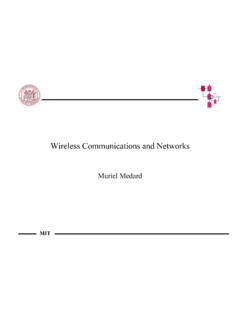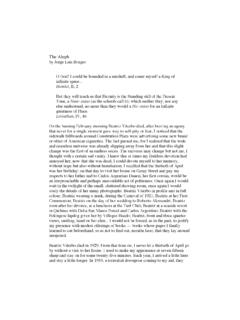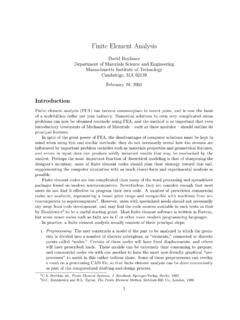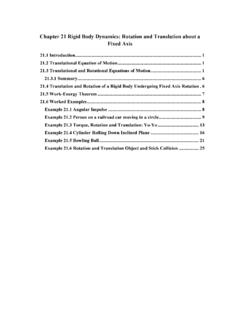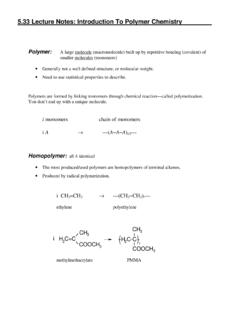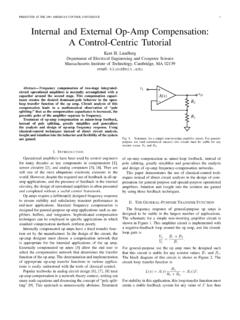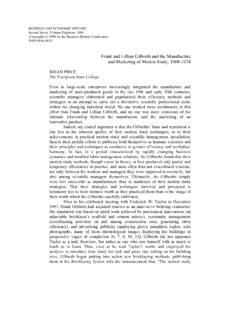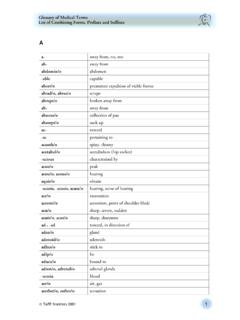Transcription of The “Uncanny”1 - MIT
1 1 The uncanny 1 (1919) SIGMUND FREUD I It is only rarely that a psychoanalyst feels impelled to in-vestigate the subject of aesthetics even when aesthetics is understood to mean not merely the theory of beauty, but the theory of the qualities of feeling. He works in other planes of mental life and has little to do with those sub-dued emotional activities which, inhibited in their aims and dependent upon a multitude of concurrent factors, usually furnish the material for the study of aesthetics. But it does occasionally happen that he has to interest himself in some particular province of that subject; and then it usu-ally proves to be a rather remote region of it and one that has been neglected in standard works.
2 The subject of the uncanny is a province of this kind. It undoubtedly belongs to all that is terrible to all that arouses dread and creeping horror; it is equally certain, too, that the word is not always used in a clearly definable sense, so that it tends to coincide with whatever excites dread. Yet we may expect that it implies some intrinsic quality which justifies the use of a special name. One is curious to know what this peculiar quality is which allows us to distinguish as uncanny certain things within the boundaries of what is fearful. As good as nothing is to be found upon this subject in elaborate treatises on aesthetics, which in general prefer to concern themselves with what is beautiful, attractive and sublime, that is with feelings of a positive nature, with the 1 First published in Imago, Bd.
3 V., 1919; reprinted in Sammlung, F nfte Folge. [Translated by Alix Strachey.] circumstances and the objects that call them forth, rather than with the opposite feelings of unpleasantness and re-pulsion. I know of only one attempt in medico-psychological literature, a fertile but not exhaustive paper by E. But I must confess that I have not made a very thorough examination of the bibliography, especially the foreign literature, relating to this present modest con-tribution of mine, for reasons which must be obvious at this time;3 so that my paper is presented to the reader with-out any claim of priority.
4 In his study of the uncanny , Jentsch quite rightly lays stress on the obstacle presented by the fact that people vary so very greatly in their sensitivity to this quality of feeling. The writer of the present contribution, indeed, must him-self plead guilty to a special obtuseness in the matter, where extreme delicacy of perception would be more in place. It is long since he has experienced or heard of any-thing which has given him an uncanny impression, and he will be obliged to translate himself into that state of feel-ing, and to awaken in himself the possibility of it before he begins. Still, difficulties of this kind make themselves felt powerfully in many other branches of aesthetics; we need not on this account despair of finding instances in which the quality in question will be recognized without hesita-tion by most people.
5 Two courses are open to us at the start. Either we can find out what meaning has come to be attached to the word uncanny in the course of its history; or we can collect all those properties of persons, things, sensations, experiences and situations which arouse in us the feeling of uncanni-ness, and then infer the unknown nature of the uncanny from what they all have in common. I will say at once that both courses lead to the same result: the uncanny is that class of the terrifying which leads back to something long 2 Zur Psychologie des Unheimlichen. 3 [An allusion to the European War only just concluded.]
6 Trans.] 2 known to us, once very familiar. How this is possible, in what circumstances the familiar can become uncanny and frightening, I shall show in what follows. Let me also add that my investigation was actually begun by collecting a number of individual cases, and only later received con-firmation after I had examined what language could tell us. In this discussion, however, I shall follow the opposite course. The German word unheimlich4 is obviously the opposite of heimlich, heimisch, meaning familiar, native, be-longing to the home ; and we are tempted to conclude that what is uncanny is frightening precisely because it is not known and familiar.
7 Naturally not everything which is new and unfamiliar is frightening, however; the relation cannot be inverted. We can only say that what is novel can easily become frightening and uncanny ; some new things are frightening but not by any means all. Something has to be added to what is novel and unfamiliar to make it uncanny . On the whole, Jentsch did not get beyond this relation of the uncanny to the novel and unfamiliar. He ascribes the essential factor in the production of the feeling of uncanni-ness to intellectual uncertainty; so that the uncanny would always be that in which one does not know where one is, as it were. The better orientated in his environment a per-son is, the less readily will he get the impression of some-thing uncanny in regard to the objects and events in it.
8 It is not difficult to see that this definition is incomplete, and we will therefore try to proceed beyond the equation of unheimlich with unfamiliar. We will first turn to other languages. But foreign dictionaries tell us nothing new, perhaps only because we speak a different language. In-deed, we get the impression that many languages are with-out a word for this particular variety of what is fearful. 4 [Throughout this paper uncanny is used as the English translation of unheimlich, literally unhomely Trans.] I wish to express my indebtedness to Dr. Th. Reik for the following excerpts: LATIN: (K.)
9 E. Gorges, Deutschlateinisches W rterbuch, 1898). Ein unheimlicher Ort [an uncanny place] locus suspectus; in unheimlicher Nachtzeit [in the dismal night hours] intempesta nocte. GREEK: (Rost s and Schenki s Lexikons). Xenos strange, foreign. ENGLISH: (from dictionaries by Lucas, Bellow, Fl gel, Muret-Sanders). Uncomfortable, uneasy, gloomy, dismal, uncanny , ghastly; (of a house) haunted; (of a man) a repul-sive fellow. FRENCH: (Sachs-Villatte). Inqui tant, sinistre, lugubre, mal son aise. SPANISH: (Tollhausen, 1889). Sospechoso, de mal agu ro, lugubre, siniestro. The Italian and the Portuguese seem to content them-selves with words which we should describe as circumlo-cutions.
10 In Arabic and Hebrew uncanny means the same as daemonic, gruesome. Let us therefore return to the German language. In Dan-iel Sanders W rterbuch der deutschen Sprache (1860), the following remarksi [abstracted in translation] are found upon the word heimlich; I have laid stress on certain pas-sages by italicizing them. Heimlich, adj.: I. Also heimelich, heinielig, belonging to the house, not strange, familiar, tame, intimate, comfort-able, homely, etc. (a) (Obsolete) belonging to the house or the family, or regarded as so belonging (cf. Latin familiaris): Die Heim-lichen, the members of the household; Der heimliche Rat [him to whom secrets are revealed] Gen.
